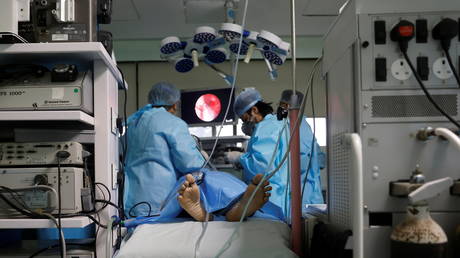
The number of cases of so-called black fungus, or mucormycosis, has almost doubled in Delhi over the past seven days, reaching 1,044 infections, the local health minister has said.
The disease has particularly affected India’s Covid patients. A further 440 people have been diagnosed in the city since last week, when the number of afflicted patients stood at 600.
Health minister Satyendra Jain said on Thursday that 89 people had succumbed to the disease in Delhi to date, while 92 others had recovered. The shortage of drugs to treat mucormycosis still remained a problem for the city of 29 million, the minister added.
Cases of black fungus have been on the rise in India during the harsh second wave of the coronavirus pandemic. As of May 25, the country saw 11,700 infections, which prompted several states to declare mucormycosis an epidemic. It also soon became clear that the health authorities didn’t have sufficient quantities of the antifungal drug Amphotericin B for the number of patients.
Capitalizing on the weakened immune system in Covid sufferers, the fungi most commonly enter the human body through the nose and mouth before spreading to the lungs, heart, or brain. Its symptoms include facial swelling and black lesions – hence its name – and it has a fatality rate of around 54%.
The spike in black fungus incidences among Indian coronavirus patients has been largely linked to the steroids and anti-inflammatory drugs prescribed during their treatment for Covid-19.
While helping to save lives, the medications also weaken the immune system, making it more difficult for it to resist the spores. Another factor is believed to be the high number of people with uncontrolled diabetes in India, as patients with this condition often suffer from the harshest forms of mucormycosis.
Think your friends would be interested? Share this story!




